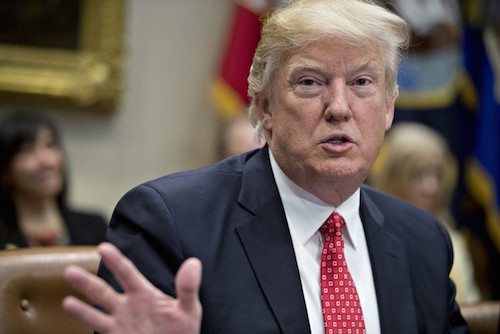After declaring that he would put “America first”, Mr Trump went on to say: “We will seek friendship and goodwill with the nations of the world – but we do so with the understanding that it is the right of all nations to put their own interests first. We do not seek to impose our way of life on anyone, but rather to let it shine as an example for everyone to follow.”
Not once did the president use the word “democracy” in his speech, nor did his America-centric world view leave room for the altruism that would justify advancing liberty. If anything, Mr Trump’s ban on travellers and refugees, many from countries that had risen against authoritarian rulers in 2011, showed he was more likely to blame the victims.
But Mr Trump is hardly alone. His predecessor, Barack Obama, was equally indifferent to democracy and human rights in the Middle East. He looked the other way when the Iranian regime crushed the Green Movement protesting over the contested presidential election result in 2009. And Mr Obama was never sympathetic to the uprising in Syria, standing by while Bashar Al Assad massacred his own people.
After the Arab uprisings began, Mr Obama remained reluctant to exploit them to help reshape the region. While he did intervene in Egypt and Libya, he did so reluctantly, because his hand was forced. There was little commitment on his part to involve the United States in the aftermath of the overthrow of both countries’ authoritarian regimes.
The irony is that president George W Bush’s “freedom agenda”, of which both Mr Obama and Mr Trump were explicitly or implicitly critical upon taking office, was shown to be justified by what happened in 2011. One could criticise Mr Bush’s desire to bring democracy to Iraq by force of arms, but he was right in seeing that freedom was a very real aspiration in the region. With the discredit that soon overwhelmed Mr Bush’s Iraq campaign, the entire idea of Arab democratisation was undermined.
That remains true, and the souring of the Arab uprisings has only further contributed to American doubts about the possibility of democratic Arab societies. Instead the attitude in much of the western world today, spurred on by terrorist attacks in their own countries, seems to be that stability is preferable, even if it means empowering autocrats.
Very few people see the profound contradiction in their position. For as long as autocrats continue to be given a free hand – on the spurious grounds that they can best fight terrorism – they will continue to create the repressive conditions that only make terrorism more likely.
And there is more. The Carnegie Endowment for International Peace – my employer – has just released a major report on the state of the Arab world, titled Arab Fractures, Citizens, States, and Social Contracts. A principal argument is that “authoritarian bargains”, in which Arab societies accepted political quiescence in return for social services and government jobs, have collapsed “as inflated budgets and bloated bureaucracies could no longer keep up with population growth”.
What this means is that the old promise of autocrats to maintain order is no longer guaranteed. Unable to buy off their societies, and relying more than ever on repression to stay in office, Arab autocrats today are more vulnerable than they were a decade ago. Yet no outsider is challenging them because the message from the Arab uprisings has been that contestation of authoritarian leaders could ultimately bring terrorism.
Is there a way out of this debilitating dilemma? The breakdown of Arab states may indeed only bring more disorder, as dissatisfied societies, no longer intimidated as they were before 2011, rise up again against their leaders. These leaders, in turn, seeing that the western democracies fear nothing more than mass migration flows, will use violence against their own populations to retain power, knowing they are unlikely to be taken to task by the United States or Europe.
There are no easy solutions, to be sure. But what is remarkable is that the debate over Arab democracy has been completely discredited in the West, dismissed as an aberration of the Bush years. Mr Trump’s “America first” mantra is one that is increasingly appealing to many European societies. Yet it’s as if these societies had completely forgotten that migrants to the West only increase when people are fleeing countries that are oppressive and poor.
Mr Trump, like Mr Obama, has helped usher in a new era of western self-centredness. But whatever the current reinvigorated nationalists say, the world has changed. Sooner or later a democratic West will again be unable to avoid the absence of democracy elsewhere, particularly in an Arab world whose upheavals will have repercussions at home.
Michael Young is a writer and editor in Beirut
On Twitter: @BeirutCalling

